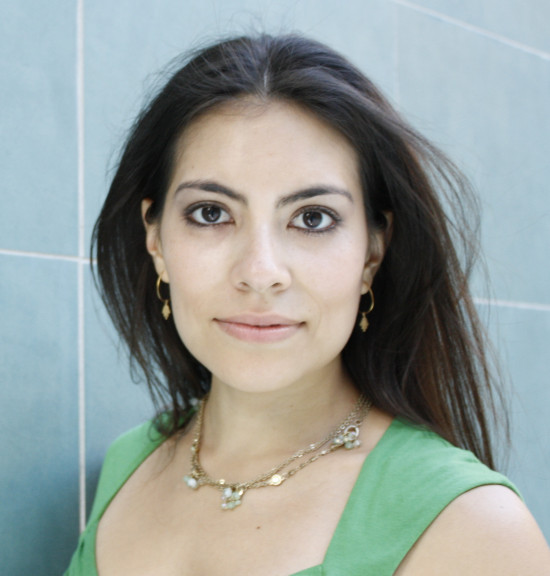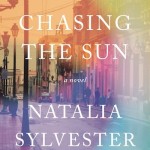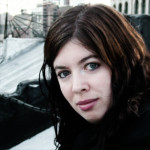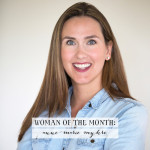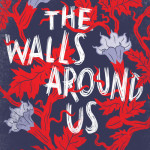 Our next MB book club title will be Chasing the Sun by Natalia Sylvester. Natalia was born in Lima, Peru and came to the US at age four. Chasing the Sun is her debut novel. She is a freelance writer and owns a small business called Inky Clean. She also regularly contributes to BookRiot and is a faculty member at the low-res Mile High MFA program at Regis University in Denver, CO. Last March, I saw her speak in Austin at The Writing Barn. She was eloquent, thoughtful, and kind, which I think you’ll discover as you read through our interview. Everyone, please welcome Natalia Sylvester to Model Behaviors!
Our next MB book club title will be Chasing the Sun by Natalia Sylvester. Natalia was born in Lima, Peru and came to the US at age four. Chasing the Sun is her debut novel. She is a freelance writer and owns a small business called Inky Clean. She also regularly contributes to BookRiot and is a faculty member at the low-res Mile High MFA program at Regis University in Denver, CO. Last March, I saw her speak in Austin at The Writing Barn. She was eloquent, thoughtful, and kind, which I think you’ll discover as you read through our interview. Everyone, please welcome Natalia Sylvester to Model Behaviors!
Enter the giveaway to win a copy of Chasing the Sun below.
MB: When I first heard the brief synopsis of Chasing the Sun, I was told it was about a political kidnapping in Peru where a married woman with two young children is taken. Her husband has to figure out how to get her back. That’s about all I knew, so in my mind, I was imagining all sorts of violent, action-movie-type scenarios. I have a feeling that is way off. How do you like to describe your book?
NS: Great question. I think because of the images and narratives we often see in Hollywood and the media—loud, big moments that get the most attention—we tend to overlook the smaller, more private ways in which we experience violence and trauma. So a kidnapping becomes about ransom drops and car chases rather than the people experiencing it, or the endless fear that comes with waiting and not knowing what’s happening to the person you love. I’ve always thought that if we’re only looking at circumstances, but not at the characters enduring those circumstances, then we’re not looking closely enough. So I guess I like to think of the book as a story behind the story. It’s not just about the kidnapping, but the family that has to find ways to survive a trauma that affects their sense of self, their relationships, and the big and small moments that make up their day-to-day life.
MB: Maybe as a writer, it’s almost an obsession to think about what’s really going on with the characters, the story behind the story, and the unexpected ways we reveal ourselves.
When you spoke at The Writing Barn, you mentioned that part of your inspiration for this novel came from your own family’s experiences. Would you mind sharing what that experience was? Once you realized what you were going to write about, how did you measure the balance between what to include and what to create from scratch?

NS: When I was three and my family still lived in Peru, my grandfather was kidnapped for ransom. He was held captive for two months before he was rescued, and during that time, my father was the one who’d wait for the kidnappers’ calls and try to negotiate his release. I don’t remember any of this, but I grew up knowing about it in a very vague way. It wasn’t something I’d ever asked my parents about, and only on rare occasions did I ever hear my grandfather speak of it.
It made me wonder how such a terrible experience could shape not just a person, but an entire family, who are also victims in different ways. I’ve always felt like fiction is a way to explore truths, especially those we may not have access to. By imagining these stories we’re giving empathy, which to me, is the most important thing we can give of ourselves. So while I did eventually talk to my family about my grandfather’s kidnapping because I wanted to start the story from a place of honesty and openness, I also thought it was important to not ask too much of them. I wanted to let myself imagine the gaps in the memories, or the places that were perhaps too difficult for them to go to.
In the end, the Jimenez family I wrote is incredibly different from my own; I wouldn’t even say they’re based off of one another, but they have a shared experience that I hope rings true and does them justice.
 MB: That is such a beautiful way of looking at it, and of explaining how even though the events and characters in fiction are invented, the truth of the story is not. What are some books or short stories that you feel really exhibit this quality of truth?
MB: That is such a beautiful way of looking at it, and of explaining how even though the events and characters in fiction are invented, the truth of the story is not. What are some books or short stories that you feel really exhibit this quality of truth?
NS: Cristina Garcia’s novel, King of Cuba, comes to mind because it does this in a very different way from most books. We’re used to seeing real-life events from the past be retold or reimagined in fiction, but in King of Cuba, Garcia writes of an octogenarian in Miami who is set on killing “El Comandante” (a clearly Fidel Castro-like figure). I found it fascinating because the question of when/how he’ll die is one that people have wondered for decades, and this story doesn’t interpret the past but rather imagines events in the future. She does this in a sometimes comical, almost satirical way that still feels incredibly poignant and true.
Julie Kibler wrote her first novel, Calling Me Home, after learning that her grandmother had fallen in love with a young black man as a teen, and that their families tore them apart. Based upon this discovery, she wrote a beautiful book that weaves a story of two teens’ forbidden love in 1930s Kentucky with that of a modern-day friendship. It’s an amazing example of how we can find truth in fiction, and how we can fill the gaps in memory and history with made-up characters and details that are no less real than what really happened.
I could go on and on…I think in all good fiction, when we find we’re connecting with something—whether it’s a character or an event or an emotion or a fantastical world of magic—it’s because it feels true to us.
 MB: Oooh, definitely adding those to my to-be-read pile! Thinking about truth and inspiration, your story is set in 1990s Peru. How much research did you have to do before you felt comfortable writing in this time period and in this location? And while we’re on the subject of research, what are your feelings? Some people love it. Some people dread it. Where do you stand?
MB: Oooh, definitely adding those to my to-be-read pile! Thinking about truth and inspiration, your story is set in 1990s Peru. How much research did you have to do before you felt comfortable writing in this time period and in this location? And while we’re on the subject of research, what are your feelings? Some people love it. Some people dread it. Where do you stand?
NS: I love research. To me it’s what builds a bridge between plot and character. My characters can’t exist in a vacuum, and it’s not until I’ve built a world for them to live in and react to that their stories truly begin to take shape. Since I tend to set my stories in real times and places, the research phase is a huge part of the process.
For Chasing the Sun, I spent months and months not even writing, just researching. I sought out books, articles, and documentaries on not just Peruvian history and politics in the 90s, but also the history of kidnapping and its psychological effects. Whereas my initial drafts of the book were set in a vague 1980s period of terrorism and political turmoil, once I dove into the research, I realized that I wanted to have the book take place in a very specific time in 1992. That was the year that President Fujimori declared what was later called the fujigolpe; he dissolved Congress and the judiciary and essentially assumed their full powers. And yet, the majority of the public approved this decision because the country was in such disarray, they felt anything had to be an improvement. To me it was a stunning example of how there’s a thin line between freedom, fear, control, and terror. And while the country experienced this as a whole, in Chasing the Sun, the Jimenez family experiences this in a very different, more personal way.
MB: I love hearing that. It’s so fascinating to hear how different writers approach their work. What does your writing routine look like (if you have one) and how does it compare to your vision of a perfect writing day?
 NS: I’m realizing that my writing routine changes with each book and story. For Chasing the Sun, I did my best writing early in the morning. I’d wake up around 5:00 or 5:30 to get some quiet hours in before my mind was more cluttered with work, and even though I’m not at all a morning person, I loved it. It’s the ultimate sense of accomplishment—to start your day by doing something you love and putting it ahead of any other priority. Some days it’d be 8:00 or 9:00 a.m., and I’d already feel like it was a great day. Then the rest of the day, even though I wasn’t writing, I’d be meditating on the characters and story in the back of my mind.
NS: I’m realizing that my writing routine changes with each book and story. For Chasing the Sun, I did my best writing early in the morning. I’d wake up around 5:00 or 5:30 to get some quiet hours in before my mind was more cluttered with work, and even though I’m not at all a morning person, I loved it. It’s the ultimate sense of accomplishment—to start your day by doing something you love and putting it ahead of any other priority. Some days it’d be 8:00 or 9:00 a.m., and I’d already feel like it was a great day. Then the rest of the day, even though I wasn’t writing, I’d be meditating on the characters and story in the back of my mind.
With the new book I’m working on, I’ve also done a lot of morning writing, and afternoon writing, and late-evening writing, and quick-little-moments-stolen-here-and-there writing. Sometimes I find I can’t stay away from a story long enough for any sort of routine to form. It becomes sporadic and addictive and impulsive and I guess that’s my idea of a perfect writing day.
MB: I’m in awe of your ability to wake up that early on a regular basis. I’ve never been able to stick to such a rigorous routine even though I know it makes a positive difference (at least for me). What were some of your biggest struggles while writing Chasing the Sun?
 NS: My biggest struggle was uncovering what the story was truly about. One of my first writing teachers once told me that there’s always a story behind a story, and so while I initially started writing about a kidnapping, I knew it was really about more than that. I must’ve written three or four drafts not knowing what that was, but hoping the process would lead me to it eventually. It wasn’t until I was writing my second to last draft that things really clicked. I was writing the scene where Andres is talking to his mother and asks how she knows Guillermo (the security consultant they’ve hired to help negotiate the terms of the ransom) when suddenly his mother responded that Guillermo helped with Elena’s kidnapping. That’s the first mention of that character. I remember thinking in that moment, who’s Elena? And it opened up the whole story for me: all of the characters’ histories and wants and hopes and regrets.
NS: My biggest struggle was uncovering what the story was truly about. One of my first writing teachers once told me that there’s always a story behind a story, and so while I initially started writing about a kidnapping, I knew it was really about more than that. I must’ve written three or four drafts not knowing what that was, but hoping the process would lead me to it eventually. It wasn’t until I was writing my second to last draft that things really clicked. I was writing the scene where Andres is talking to his mother and asks how she knows Guillermo (the security consultant they’ve hired to help negotiate the terms of the ransom) when suddenly his mother responded that Guillermo helped with Elena’s kidnapping. That’s the first mention of that character. I remember thinking in that moment, who’s Elena? And it opened up the whole story for me: all of the characters’ histories and wants and hopes and regrets.
MB: I love those moments! It’s like something shifts inside and then all of a sudden you see your story in a completely different way. Soon you start to wonder, how did I ever imagine it any other way than this?
Shifting gears a little bit, on your “About” page on your website, you mention that “community and compassion” are a couple of your favorite things. On Model Behaviors, those are two things we also greatly appreciate and strive to nourish in our lives. For you, why are community and compassion so important?

NS: Because life would be so meaningless if we lived it only for ourselves. And the world would be a lonely place, for every single person in it, if we never put ourselves in another person’s shoes and chose to care about them. It always comes down to stories. We each carry so many stories within ourselves—some we share, some we keep—and I think being compassionate is really about saying “I may not know your whole story, I may not know all of what makes you happy or pains you, but I know kindness, so that’s what I’ll give to you.”
 The same goes for community. Alone, I’ve written one book. My greatest source of pride is not the fact that the one novel exists, but that it’s part of a community of writers and works I’ve admired all my life. That I can contribute in some small way is an honor. It’s all about being a part of something bigger than yourself. If you really love something, you help it grow. And you can’t do that by only helping yourself.
The same goes for community. Alone, I’ve written one book. My greatest source of pride is not the fact that the one novel exists, but that it’s part of a community of writers and works I’ve admired all my life. That I can contribute in some small way is an honor. It’s all about being a part of something bigger than yourself. If you really love something, you help it grow. And you can’t do that by only helping yourself.
MB: Have you ever read The Write Crowd by Lori A. May? It’s all about fostering your literary community, putting others before yourself, and understanding the essential truth that when you genuinely invest in community, the return will be far more beautiful than anything you could’ve ever achieved alone. It also provides insight and advice on how to do this if it doesn’t come naturally. It’s been one of my fave writing advice books this year. The cool thing is, I think it applies to any sort of personal endeavor—writing a book, playing in a band, or starting your own business.
Which brings me nicely to my next topic, your business! Inky Clean! Can you give us a few details about what Inky Clean is and how you decided to start your own company?
NS: I haven’t read The Write Crowd, but it’s definitely on my list now. Sounds like an amazing read.

As for Inky Clean…! My other creative child! I refer to it as my child because it’s grown so much from when I first started it in 2010. At the time, I’d been freelance writing full-time for about 3 years, after having worked as an editor at a magazine. My husband and I had moved to Texas so he could go back to school, and it dawned on me that I needed to take my self-employment to the next level if I was going to support us both and somehow still find the time to write and publish my novel.
Up until that point, I’d done mostly magazine work, with some experience in marketing and PR. I wanted to shift focus to copywriting but also knew that I wanted to work with a very specific roster of clients. To me, this had nothing to do with industry or specialty and everything to do with something less tangible—someone who didn’t want business writing as usual, someone who was okay with being quirky or witty or letting their personality shine through in their branding. And I realized that person and I had a lot in common, so the best thing I could do was to put my truest self out there. That’s how I came up with Inky Clean.
It’s fun, it’s bubbly, it doesn’t take itself too seriously, and it’s totally professional but never boring. I have a blast with it—my clients are mainly in creative or socially conscious fields. I’ve written copy for natural skin care lines (it’s SO cool to see my writing on a bottle!), interior designers, jewelers, but I also work in all areas of branding and messaging, like coming up with names and slogans for new businesses. What’s amazing is that like fiction, the best messaging has a great narrative behind it. So I get to uncover stories with Inky Clean, too.
MB: I love that your approach has been so intentional, and you know exactly which types of clients you’d work with best. I think that mindfulness really comes through on the Inky Clean website.
I just have one last thing to ask. It’s a question I like to ask all of our MB Book Club authors because I feel like every person goes through it, whether she’s a writer, a student, a business owner, anything! What advice do you have for anyone struggling with self-doubt?
 NS: My take on self-doubt is this:
NS: My take on self-doubt is this:
Any dream worth having is going to be hard sometimes. It’s scary but also exhilarating and unpredictable, and it leaves us with essentially, two choices—let fear of failure stop you, or let the possibility of success drive you. And if you really think about it, we shouldn’t fear failure. It is absolutely necessary. It’s a step or two among many on the way to something much bigger. Whenever I start to feel the pull of self-doubt, I think of a worst-case scenario: the worst thing that could happen is not that I try and fail. The worst thing that could happen is actually nothing. So even a small action is its own victory. Chase your dreams with these tiny triumphs—one, after the other, after the other.

Thanks again to Natalia Sylvester! Be sure to follow her blog, Facebook, Twitter, and Instagram. To find out about future appearances and future book releases from Natalia, be sure to sign up for her mailing list.
If you’d like to win a hardcover copy of Chasing the Sun, entering our giveaway is simple. Just log in (with either your email or your Facebook profile) and fill out the form below. Anyone can enter, but you get extra chances to win by signing up for our mailing list and/or by visiting Natalia’s Facebook page.
This giveaway is open in the US and internationally. Must be 14 or older to enter. It ends on Wednesday, July 22, at 11:59 p.m., Central Time. A winner will be chosen at random and announced on Thursday, July 23. We’ll contact the winner by email. Winner will have 72 hours to respond. If there is no response, a new winner will be chosen.
Good luck to everyone who enters, and stay tuned next week for info on the book club discussion!

